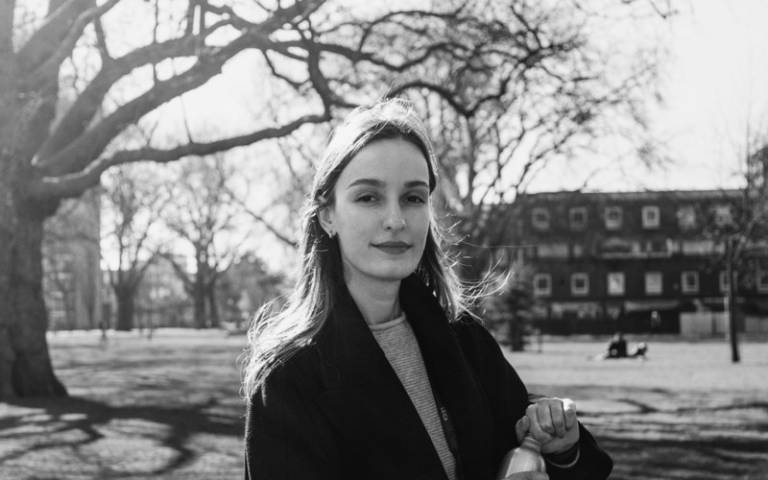Seven Questions with... Varvara Karipidou
19 April 2024
This week we're joined by PhD student Varvara Karipidou. Varvara chats to us about her research into the intersection of politics and urban planning in Eastern Europe, taking a collaborative approach to a PhD, and the best green spaces near campus.

What are you studying, why are you interested in this subject, and what do you plan to do in the future?
I'm currently halfway through my PhD, focusing on the politics surrounding urban development processes in Eastern European post-democratisation. My interest in critical urban studies was sparked after graduating from architecture school. I delved deeper into this field during my second MSc degree in urbanisation and development processes at the LSE. Following some years of work as an architect and urban planner in Eastern Europe, I made the decision to return to the UK and pursue my PhD at UCL. Here, I aim to explore the intersection of politics and urban planning policies in the region.
Looking ahead, I have numerous thoughts and ideas for the future, but one thing is certain: continuing my research and remaining actively involved in academia are central to my plans.
What is the most interesting thing you’ve done, seen, or gotten involved with while at UCL?
During my time at UCL, two experiences stand out as particularly enjoyable and rewarding. Firstly, I had the opportunity to organise, along with friends and colleagues, the summer school for the Department of Geography for two consecutive years. This involved planning seminars, activities, and a small field trip, selecting teaching materials, and engaging with students.
Secondly, being awarded the Next Economy Trust Fellowship was a significant highlight of my time at UCL. This fellowship will support and enhance my research efforts, allowing me to explore the spatial and social consequences of urban policies involving state and non-state actors in post-democratic Eastern Europe. Additionally, the fellowship provides me with the opportunity to engage with a broader academic community dedicated to producing ground-breaking work.
Have you discovered any hidden gems during your time at UCL?
The first thing that comes to mind is the reading rooms in the British Library. For quiet study spaces, consider obtaining a British Library membership as a student, granting access to their reading spaces and vast collection of books. Additionally, the UCL hub at the Senate House provides another nice environment for reading, away from the crowds.
When in need of a break, take advantage of the many parks surrounding the campus. These green spaces offer opportunities for leisurely walks, enjoying lunch, reading, or meeting friends and colleagues for a quick coffee before returning to work.
In general, London offers many hidden gems, and UCL's location is a good starting point for walking around and exploring the city.
Give us your top three things to do/see/go to in London:
In London, I particularly enjoy exploring art shows and exhibitions, attending plays at the theatre, and experiencing music events. The city offers a wide range of options, from renowned galleries like the Tate and the British Museum to smaller, independent venues where some of the best events occur. London's diverse cultural scene ensures there's always something new and exciting to discover in the realms of art, and there are many ways to get involved in these if someone is interested.
If you could study a different subject, what would it be and why?
Although there are many different subjects that I wish I could explore more, I wouldn’t choose to study anything else. I was also lucky because architecture, and social sciences more generally, offer a lot of alternatives and different paths for someone to follow based on what interests them more.
Who inspires you and why?
I'm inspired by a long list of people, like my family, my sister, friends, and even individuals I've briefly encountered or heard/read about. However, what truly inspires me are the small acts of kindness witnessed in everyday life. These gestures fill me with optimism, especially during challenging times like the present.
What would it surprise people to know about you?
I haven’t thought about this before. I don’t really have a good answer for this, but I would say that many people think of the PhD as a lonely process driven by individual effort. However, for me, I find value in being part of a team and collaborating with others. I enjoy discussing my research and being open to new ideas, and I believe that this collaborative approach is feasible even for a PhD student. Not a very surprising or fun fact, I know! But maybe it is a useful thought for anyone considering pursuing a PhD in the future.
 Close
Close

